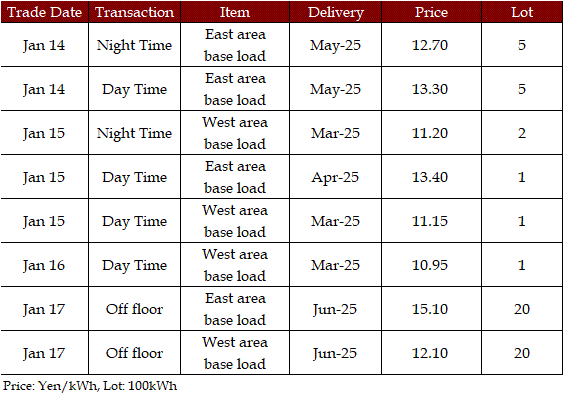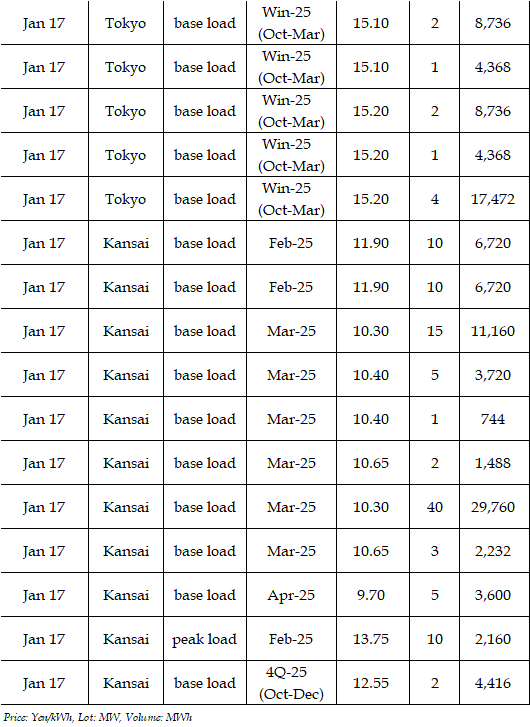|
In the day-ahead market on JEPX (Japan Electric Power Exchange), the 24-hour spot power prices on a weekly average basis for Jan 13-17 delivery weakened from the previous week in both East Japan (50Hz) and West Japan (60Hz). Except in North Japan and Hokuriku, the weather was favorable mostly during the week, so that output from photovoltaic generation increased from the previous week. In the middle of the week, the temperatures in Kanto rose to high levels normally seen in March, giving a bearish impact on spot prices. On top of that, no visible troubles were detected at generation facilities. Stable supply put a lid on spot prices, at a time when JERA restarted the 1,188.2MW No1 unit in the No7 train at its mega Nishi Nagoya LNG-fired power station in Chubu on Jan 16 after completing regular maintenance started Sep 1 last year.
In Tokyo and Kansai, the key areas in East Japan and West Japan, the 24-hour average posted a difference in favor of the East by Yen 1.90 for Jan 13 delivery, Yen 1.09 for Jan 14 delivery, Yen 1.01 for Jan 15 delivery, Yen 0.58 for Jan 16 delivery, and Yen 0.94 for Jan 17 delivery.
The fuel market trends in the third week of January were detailed as follows.
DES Northeast Asia spot LNG prices hovered in the low $14 level per mmBtu for prompt March 2025 arrival as of Jan 16, up about 50cts from the end of the previous week (Jan 10). European natural gas prices gained ground from the previous week, and the LNG market in Northeast Asia followed suit. But the gain in LNG prices was capped by an unabated supply glut in Northeast Asia. The Ministry of Economy, Trade and Industry (METI) announced on Jan 15 that Japan's LNG inventories for power generation stood at 2.11 mil mt as of Jan 12, up 340,000mt from a week before. The figure was down from 2.15 mil mt as of end-January last year, but up from the average of past five years at 1.96 mil mt.
FOB Newcastle thermal coal prices in Australia stood in the high $114 level per ton for January 2025 loading as of Jan 16. The level was down more than $1 from the end of the previous week.
In the crude oil market, WTI crude for February 2025 stood in the high $78 level per barrel as of the morning on Jan 17 while Brent crude for March 2025 was trading in the low $81 level. Compared with the end of the previous week, WTI rose by more than $2 while Brent was about $1.50 higher. Crude prices were bolstered by concerns over tighter supply from Russia after US decided to impose additional sanctions against Russian oil on Jan 10. On top of that, weekly oil statistics released by the US Energy Information Administration (EIA) on Jan 15 showed US crude oil inventories dropped by 2.0 mil barrels for the week ended Jan 10.
The actual highest price during the week was at Yen 20.73 in eight areas except Shikoku for Jan 16 delivery. Meanwhile, the actual lowest price during the week was at Yen 0.01 in Shikoku for Jan 15 delivery.
By area, the weekly average of the 24-hour spot prices was at Yen 15.21 in Hokkaido, down Yen 0.32 from the previous week, Yen 14.85 in Tohoku, down Yen 0.42, Yen 14.87 in Tokyo, down Yen 0.55, Yen 14.79 in Chubu, down Yen 1.04, Yen 13.91 in Hokuriku, down Yen 0.71, Yen 13.77 in Kansai, down Yen 0.83, Yen 13.76 in Chugoku, down Yen 0.84, Yen 9.19 in Shikoku, down Yen 3.75, and Yen 12.97 in Kyushu, down Yen 0.55.
In the JEPX auction, volumes of offers were 1,257.69 mil kWh on a weekly average basis, up 5.3% from the previous week. Meanwhile, bids on a weekly average basis shrank by 2.5% to 1,041.18 mil kWh. The weekly average of trade volumes waned by 0.8% to 838.11 mil kWh.
Power demand in nine areas of Japan during Jan 13-17 was a combined 14,132.51 mil kWh, down 1.2% from 14,302.82 mil kWh during Jan 6-10. The figure was up 2.5% from the corresponding period a year earlier. Demand during Jan 15-19, 2024 after day of week adjustment was 13,791.79 mil kWh.
Deals reported on TOCOM (Tokyo Commodity Exchange) during Jan 13-17 were as below.

Deals reported on EEX (European Energy Exchange) during Jan 13-17 were as below.








In the fourth week of January, spot prices are expected to deepen losses from the third week. The temperatures are forecast to stay relatively high across Japan, with the day's high in southern Kyushu expected to exceed 15 degrees in the latter half of the week. The highest temperature in Kanto will not fall below 10 degrees, and the day's high in Tokyo is expected to stay around 12-13 degrees mostly during the week. On top of that, the weather is widely forecast to be sunny except the beginning of the week, so that ample solar power supply is likely to weigh on day time prices. In Kyushu and Shikoku with a heavy dependency on photovoltaic generation, spot prices will often have a high chance to hit Yen 0.01.
|
JEPX: System Price (Day Ahead 24 hours)
|
|
Weekday Price
|
13-Jan
|
14-Jan
|
15-Jan
|
16-Jan
|
17-Jan
|
|
24-Hour Ave
|
13.03
|
13.08
|
13.66
|
15.07
|
14.61
|
|
Volume (MWh)
|
786,029
|
839,402
|
854,730
|
850,961
|
859,414
|
|
(unit: yen per kWh) (date: delivery day)
|
|
|

|